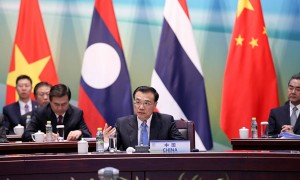Chinese Premier Li Keqiang delivers the government work report during the opening meeting of the second session of the 12th National People's Congress (NPC) at the great Hall of the People in Beijing, capital of China, March 5, 2014. (Xinhua/Li Xueren)
Li's report, delivered at the opening meeting of the national legislature's annual session, set this year's economic growth target at 7.5 percent, the same as last year's target and slightly lower than the 7.7-percent actual growth in 2013.
Other key economic goals, such as consumer price index (CPI) and unemployment rate, remain generally the same as those of last year.
Li said the reform will focus on the most wanted areas, the most pressing problems and the sections having the biggest consensus.
"We must rely fully on the people, break mental shackles and vested interests with great determination," he told nearly 3,000 deputies to the Second Session of the 12th National People's Congress (NPC) at the Great Hall of the People in central Beijing.
Chi Fulin, head of the Hainan-based think tank China Institute for Reform and Development, told Xinhua that the report not only offers solutions to existing problems but also points out the direction in the future.
"As Premier Li's first government work report, it is solidly based on reality and shows a long-term perspective," Chi said.
Li described the situation China faces this year as "a complex environment" with both favorable and unfavorable factors.
Internationally, in addition to the unstable and uncertain global economic recovery, some countries' policy adjustments introduce new variables into the equation and emerging economies are facing new difficulties and challenges, he said.
Domestically, deep-seated problems are surfacing while painful adjustments need to be made, he said.
"The pace of economic growth is changing and downward pressure on the economy remains great," he said.
However, the premier held that China is able to maintain a moderate and even high economic growth for some time to come as industrialization and urbanization are continuing and there is considerable potential for regional development.
Li's report listed three principles for this year's work. Apart from deepening reform, the central government is to keep economic performance within a proper range and to raise the quality and returns of development, promote industrial upgrading and keep improving people's wellbeing.
"Reform is the top priority for the government's work this year," he said.
MAJOR REFORM AREAS
China launched a grand reform plan last November at the third plenary session of the 18th Communist Party of China (CPC) Central Committee, including about 330 measures in 60 aspects.
In Wednesday's report, the premier reiterated the market's decisive role in allocating resources and a better role of the government.
"The report eyes smoothing the relations between the market and government, which is the center of the country's economic reform," Chi Fulin said.
The economic restructuring tops all reform measures in Li's report and the highlighted ones include the administrative system, the fiscal and tax systems, the financial sector and equal development of state and non-state enterprises.
As a major attempt to transform government functions, the central government plans to add another 200 administrative approvals to the list of being abolished or delegated to governments at lower levels, following the 416 ones last year.
The priority in reform of fiscal and tax system is to improve the transparency of budgets. Governments at all levels will be asked to publish their budgets and final accounts. Step by step they will include details of expenditures, especially public spending on official overseas visits, official vehicles, and official hospitality.
China has tried to replace business tax with VAT in several service sectors and this year the practice will be extended to railway, post and telecom services.
Regarding financial reform, the most notable part is to grant financial institutions more power to set interest rates, steadily let in private capital in small and medium-sized banks and promote Internet finance.
In a country that used to eliminate private sectors for decades, the premier's report pledged equal development of entities of all ownership.
"We will improve the property rights system to ensure that property rights are inviolable in both the public and non-public sectors," the premier said.
The government will allow non-state capital to take part in some projects in areas such as banking, oil, electricity, railway, telecommunications, resources development and public utilities, which are normally dominated by state-owned enterprises.
Reform measures were mentioned in almost all aspects of Wednesday's government work report, ranging from agriculture, urbanization, healthcare, education to environmental protection.
Further reform is not only a resolve of the leadership but also an aspiration of the public.
Liu Xiya, an NPC deputy hearing Li's report at the Great Hall of the People, was inspired by the reform measures put forth in the report.
"We know we have to make changes in the school education, but there are always barriers. We need the support from the higher authorities," said Liu, a primary school principal from southwestern Chinese city of Chongqing.
She said she is delighted to see a strong reform incentive from the central leadership and believes it will help with her cause.
CHALLENGES AHEAD
"We must be keenly aware of the many difficulties and problems on our road ahead," Li said. "The foundation for sustaining steady economic growth is not yet firm, and the internal impetus driving growth needs to be increased."
The report listed risks in fiscal and financial sectors, excess production capacity in some heavy industries and more difficulties of macro-control.
The premier also worried about the challenges in increasing agricultural output and rural income, curbing air, water and soil pollution, conserving energy and reducing emissions.
People are not happy about housing, food and drug safety, medical service, old-age services, education, income distribution, land use and demolition and security, he said.
He also admitted that some civil servants are prone to corruption and do not do their job with integrity and diligence.
"The government must first examine itself to identify the causes of these problems and work out ways to resolve them," he said.







